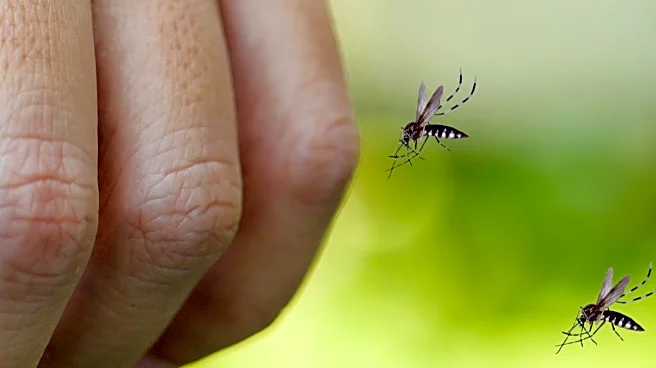What's Happening?
Residents of Ballykelly, a village in County Londonderry, are experiencing a resurgence of mosquito bites, leading to significant discomfort and health issues. Molly Clarke, a local resident, reports severe reactions to the bites, which have left her
with large, itchy red spots and rashes. The issue, which was also prevalent last year, has prompted some residents to stay indoors to avoid the insects. A study by Queen's University Belfast and the Agri-Food and Biosciences Institute has identified multiple mosquito species in the area, including Aedes detritus and Culex pipiens, which are known to bite humans and animals. These mosquitoes, while not currently a major disease threat, cause significant irritation and discomfort. The Public Health Agency advises that while most bites are not serious, they can sometimes lead to infections or allergic reactions.
Why It's Important?
The increase in mosquito bites in Ballykelly highlights a growing public health concern, as residents face both physical discomfort and potential health risks. The situation underscores the need for effective pest control measures and public awareness to mitigate the impact of these insects. The presence of multiple mosquito species capable of biting humans raises questions about environmental changes and their effects on local ecosystems. This issue could have broader implications for public health strategies, particularly in managing insect populations and preventing potential disease outbreaks. Residents, especially children, are at risk of infections and allergic reactions, emphasizing the importance of community health initiatives and preventive measures.
What's Next?
Further research and monitoring of mosquito populations in Ballykelly are expected to continue, with local authorities and health agencies likely to implement strategies to control the mosquito population. Residents may need to adopt preventive measures, such as using insect repellents and installing screens, to reduce exposure. The findings from ongoing studies could inform broader public health policies and pest management practices in the region. Community engagement and education will be crucial in addressing the issue and minimizing its impact on residents' quality of life.
Beyond the Headlines
The situation in Ballykelly may reflect broader environmental changes, such as climate variations, that could be influencing mosquito behavior and distribution. This raises questions about the long-term ecological impacts and the need for adaptive strategies in public health and environmental management. The discomfort and health risks faced by residents also highlight the social and psychological effects of living in areas prone to insect infestations, which can affect community well-being and lifestyle choices.















